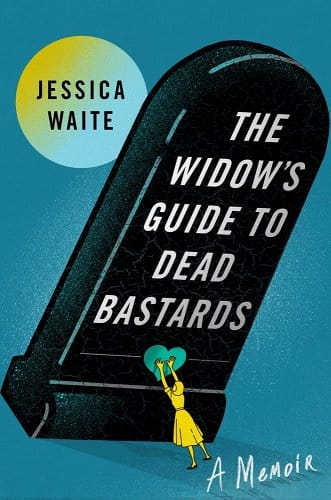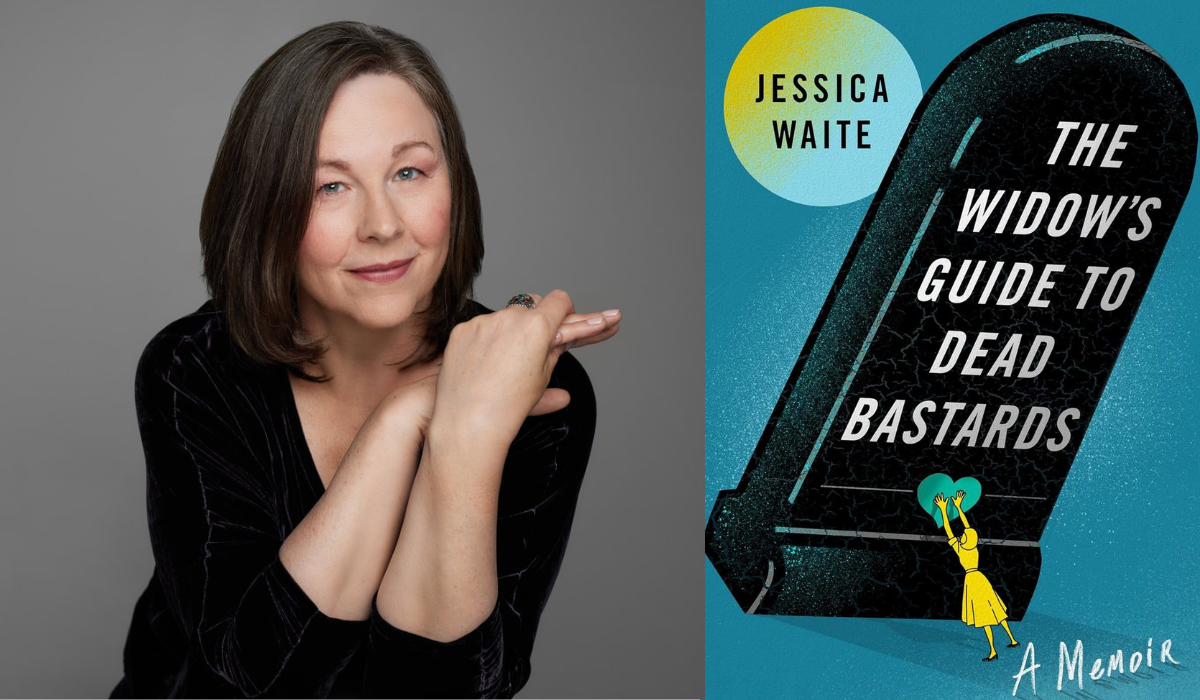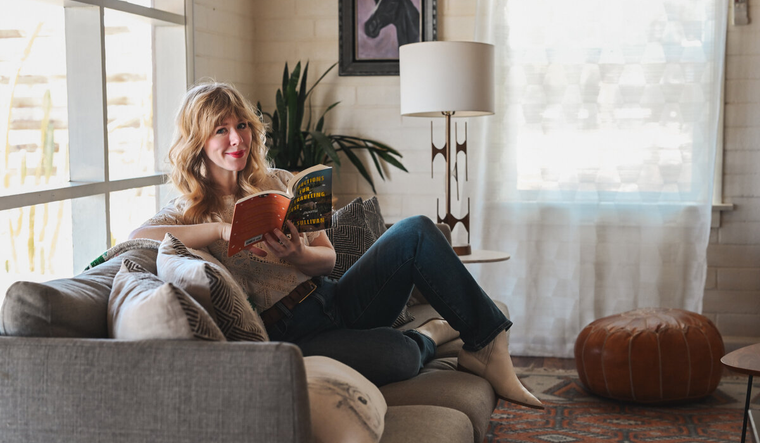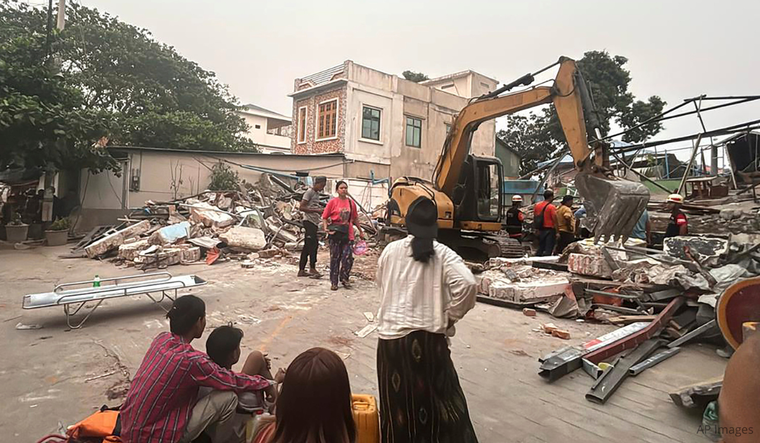Her Beloved Husband Died—Then She Learned of His Betrayal. Here’s How She Found the Courage to Heal
The opening pages of Jessica Waite's memoir The Widow's Guide to Dead Bastards will stun you. Waite, a poignant writer, tells of discovering secrets her late husband had been keeping from her—gutting secrets that she learned of after her husband suddenly died.
What follows is an exploration of Waite's tangle of loss, betrayal, and sadness and a beautiful telling of how she moved toward healing and understanding. Her story has darkness and also bright light, unflinching tenderness, and hope. It's hard to admit when someone you love deceives you, Waite tells us. But when she found the courage to face the truth, "it freed me of shame, and let my heart open back up."
A CONVERSATION WITH JESSICA WAITE
Your memoir contains many giant life truths, including love, loss, grief, and betrayal. How do you describe it to people?
I talk about all those things. It is a grief memoir. I've also referred to it as a posthumous love story because it's asking the question: Can relationships heal across the veil of death? How do you go on if you have had someone die, leave you, or a relationship end in another way when it's not in a place of resolution? How can you trust again?
One of the things that feels important to me in this cultural moment is how hard it is to admit when we've been deceived. And how hard it is to just face the truth that someone you loved and trusted was lying to you. So many things are required to revise your picture of who that person was and who you are. It's a big hurdle—to know someone's been lying to you, and you have to keep believing. So, in some ways, this book might also be about courage in facing the truth and what happens when you do that, which was so liberating in my case. It freed me of shame and let my heart open back up. I'd make the case that it's worth it to do the hard work of facing the truth.
This all touches on how utterly complex loss and grief are, as well as betrayal. In your memoir, you write about your late husband, "Sean was lying to me—big lies—every single day. It feels like everything he ever said to me must have been a lie." For someone who has gone through something of loss and betrayal, what do you hope your book offers them?
That line that you just quoted, I have so much compassion for myself in that moment. And I can hear the totalizing aspect of "everything he ever told me." It feels like nothing could have been true, or even if it was, it's not worth the work to sift through that. So for somebody who's going through that right now, it's so isolating, it's so overwhelming. I would hope that they would feel less alone. I hope that watching someone else bash around, make some mistakes, and find some way for themselves would help them have faith in themselves and know that it will get better for them.
As you were writing about such painful memories, what did you have to ignore or lean into to help you?
At first, it was giving myself the permission to tell the truth. At first, when I was writing about it, it was catharsis journaling to get it out of the loop in my head. But when it became apparent that I was going to try to put this into the world, I had to go slowly and build up my courage, step by step. I had to build up the courage to write things that I revealed about Sean that I didn't want to say, the things I revealed about myself. Some of my worst moments, things that I would never want to tell, are in the story. I had to believe I'd be brave enough to do it when the time came. And also that there would be people who would want to read it.
Another thing that helped me was just finding support. The biggest thing in all of this is that we heal in community. That was true in my writing life and my personal life as I tried different modalities. I'd meet people and start to make friends that weren't in my life before, which is another part of rebuilding after something like this.
There's a magical moment in the book when you tell the story of asking your friend Kate to write a poem about Sean. Will you tell that story?
I had asked her to send me something as part of a healing ritual around Sean that takes place at the end of the story. I hoped she'd send me a poem that asked the question, How shall I remember you? She was super anxious about having to deliver this thing, and she went to a healing circle of her own. The poem came to her as if Sean were directly answering her question. Then, the whole process of getting it down and sending it to me felt like a divine kind of inspiration. It's kind of hard to talk about. But it was so overwhelming when she gave it to me that I felt a little bit bowled over. I love that poem so much, and I hope that people will use it if they have to speak at a service or are trying to decide what to say to someone grieving.
Another profound subject in your memoir is that of mental health and Sean's struggle with his mental health. What do you hope your book sparks in terms of a wider conversation around mental health, particularly men's mental health?
People often asked me about the title of this book. And I'm very happy with the title, even though it courts a bit of controversy. But if there's one travesty in the title, it's not that I'm speaking ill of the dead; it's that this title will potentially alienate men. While, actually, there is so much for men in this story, especially around mental health. There are pressures that men feel to perform a certain way, to achieve a certain way, to hide their vulnerability and their weakness—I think it's an epidemic. Societally, we need to talk about it more to destigmatize it.
It was so important to me that in telling this story, there was a redemption arc for Sean, and that Sean was held as a human being and was held with compassion and understanding. My goal in all of this was to figure out what was driving Sean. Who was he? Why was he hiding these things? If I had seen things sooner, maybe he would have received a different kind of help. I think there are places of potential in healing at the family, work, and societal levels, but we miss those opportunities when we're putting on a brave face or powering through.
What has been transformative for you as you have been working toward your healing?
I've realized that there's something in us, a kind of energy. The ancient Greeks called it Thumos: the energy that opens and closes a heart. There's a scene in the book where I feel my heart constricting and closing. Later, I was so grateful because I think that protected me. So, I started to track what opens and closes my heart. Sometimes, we need to be steely and make those decisions in a real masculine way; sometimes, we need to be soft and gentle and welcome each other in. So, to answer the question, I learned that our hearts are capable of all of that. We have a tendency to stay in one mode, but the force of life is the opening and closing of a heart. When it's broken, it feels like it'll never be better again, and yes, maybe you need to pull it in at that time, but then it will open again.
I also think of beauty. Grief loves beauty, so when you're hit with a wave of grief, if you can put yourself in the way of beauty, it is soothing.

Jessica Waite is an author who leads people to heal through writing and mentors incarcerated writers through the Hero's Journey Prison Writing Project. She's an award-winning essayist who lives in Calgary, Alberta. Learn more about her and her work here.
Please note that we may receive affiliate commissions from the sales of linked products.



